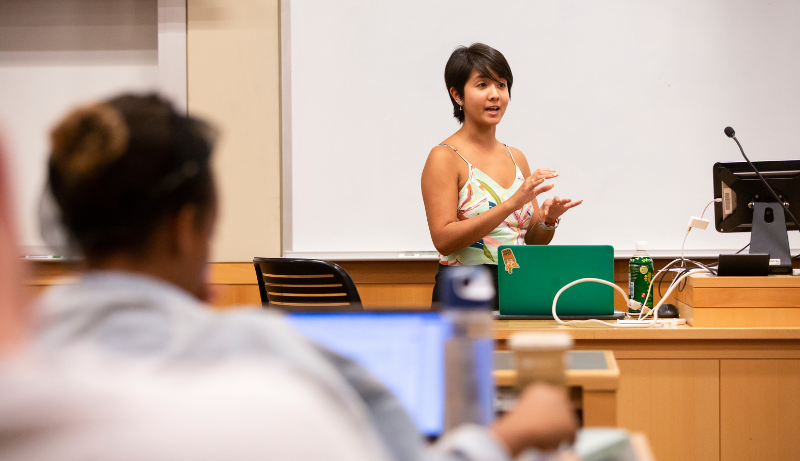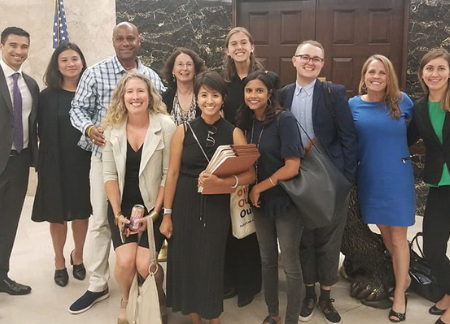
By Sarah Weld
Stephanie Campos-Bui ’14 has won the UC Berkeley Chancellor’s Award for Community-Engaged Teaching for her extensive — and impactful — work on the harmful effects of criminal legal system fees and fines.
Deputy director of Berkeley Law’s Policy Advocacy Clinic, Campos-Bui teaches and supervises interdisciplinary teams of law and public policy students pursuing non-litigation strategies to address systemic racial and economic injustice. Clinic Director Jeff Selbin says she has played a critical role in driving research and advocacy that has helped persuade seven of the 10 overall states that have reduced or eliminated juvenile system fees since 2017.

“I cannot think of anyone at the university over the last few years who has had a greater impact in the lives of low-income Californians of color or who is more worthy of this award,” says Selbin. “I can point to the dozens of students she has taught, trained, and directly supervised in successful policy advocacy campaigns, the clinic’s three major reports on fines and fees that she co-authored in the last few years, the tens of thousands of California youth and families relieved of $350 million of juvenile system debt, and the millions of adult Californians relieved of more than $16 billion in criminal system debt.”
The Chancellor’s Awards for Public Service honor individuals and groups for their exceptional commitment to advancing social change through public service, a pillar of the university’s public mission. Campos-Bui’s award recognizes faculty leaders who develop or teach community-based courses, or engage students in community-based research.
“Often in academia and policy-making spaces, the input and voice of the community is deprioritized. When impacted community members are not consulted or involved, policy change can often result in unintended consequences or threaten long-term reform movements,” says Campos-Bui, a key part of the clinic since her law school days and a clinic faculty member since 2015.
“But when we support community to lead, change can be truly transformative. I am thrilled to be part of a public university that recognizes the value of community in its approach to research, service, and teaching and I am honored to receive this award.”
Her work has focused on abolishing fees in California’s juvenile and criminal legal systems, which the clinic’s research has shown disproportionately affect low-income Black and Brown families.
As recently as 2017, juvenile courts charged youth and their families fees — including for “free” public defenders, detention, probation, and electronic monitoring. And until just last year, California state law charged about 100 different fees to adults in the criminal legal system.
Campos-Bui recently helped launch the national Campaign for Debt Free Justice with the Juvenile Law Center and the National Center for Youth Law. She calls California “an incubator for reform,” and has helped take the clinic’s proven playbook nationwide to support other communities working to abolish similar fines and fees.

Sarah Brandon J.D./M.P.P. ’22, a clinic student for three years (first as a policy student and then as a law student), says Campos-Bui “has taught me so much about how to engage authentically with community partners and the importance of using legal and policy advocacy tools in service of community goals. She models a true commitment to prioritizing the people who are most impacted by policy decisions.”
A native Californian of Chinese, Mexican, and Indigenous descent, Campos-Bui has witnessed how the juvenile and criminal legal systems have affected her family and community.
“The law will never be abstract for me. I’ve seen firsthand what perceptions of who is deserving and who belongs have an impact on my own friends and family members and the opportunities that they have had,” she says. “There is no way of separating out this work from my own life, and it is what I bring with me every day to my teaching.”
Prior to joining the clinic, Campos-Bui served as a public interest fellow at the East Bay Community Law Center (EBCLC) in its Education, Defense and Justice for Youth Practice, where she held school-based legal clinics in Oakland and provided special education representation to youth at risk of dropping out of school and entering the juvenile system. In law school, she participated in EBCLC’s Health/Welfare Clinic and the Policy Advocacy Clinic (which began under the EBCLC umbrella) and received the Brian M. Sax Prize for Excellence in Clinical Advocacy-Honorable Mention.
Laurel E. Fletcher, director of Berkeley Law’s Clinical Program and co-director of its International Human Rights Law Clinic, says: “Stephanie is a transformative teacher, bridging the talents of Berkeley students with the inspiring and pathbreaking work of community coalitions to work collaboratively to dismantle systemic racial injustice. She is UC Berkeley’s teaching at its best.”